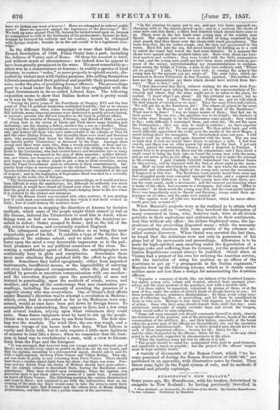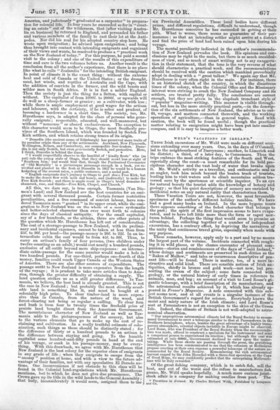HIIRSTHOPSE'S NEW ZEALAND. * SOME years ago, Mr. Hurstliouse, with his
brother, determined to emigrate to New Zealand ; he having previously travelled in
• Neu, Zealand ; or Zealandia.the Britain of tho South. By Charles Hursthouse. In two volumes. Published by Stanford.
America, and judiciously 4' graduated as a carpenter" in preparation for colonial life. In four years he succeeded o far in "creating an estate" out of the wilderness, that (after visiting Australia on business) he returned to England, and persuaded his father and various members of the family to east their lot at the Antipodes. Nor did his zeal for his adopted country stop here. He wrote upon emigration; he advised upon emigration; and being thus brought into contact with intending emigrants and cognizant of their views and wants, he resolved to produce a "practical work on the New Zealand of today." For this purpose, he paid a second visit to the colony; and one of the results of this expenditure of time and care is the two volumes before us. Another result is the conclusion from all the author's experience, that there is no place like what he calls " Zealandia " for the intending British emigrant. In point of climate it is the exact thing: without the extreme heat and cold of Canada or the United States ; or the drought, sand, hot winds, and reptiles of Australia and the Cape, with the addition of convicts in the former, and the wild beasts and wilder men in South Africa. It is in fact a milder England. Then the society is just the thing for a Briton, with capital or without. The capitalist of from 1000/. to 20001. or upwards will do well as a sheep-farmer or grazier; as a cultivator, with less ; while there is ample employment at good wages for the artisan and labourer, with the certainty, if he is sober and prudent, of becoming a landowner in a short time. The society, too, Mr. Hursthouse says, is adapted for the class of persons who generally emigrate ; respectable, educated, and well-mannered, but without " nonsense " or absurd exclusiveness. The exception to this character would seem to be Otago, the most Southerly province of the Southern Island, which was founded by Scotch Free Kirk settlers, and which retains strong traces of its origin.
"Dunedin (the ancient name of Edinburgh) has preserved more traits of its peculiar origin than any of the settlements. Auckland, New Plymouth, Wellington, Nelson, and Canterbury, are cosmopolite free-traders. Dunedin is not only Scotch, but even provincially Scotch, and protective. Here, I think, Dunedin is behind the tames. "I would respectfully observe to the handful of kindly Scots' who (as yet) rule the young state of Otago, that they should scowl less at sight of Southron loon,' and would hint that, though the Puritanical Covenanter of 'Old Mortality' is a picturesque personage enough in a book, yet revivified and planted in the flesh at Dunedin in 18.57 he would be a human hedgehog of the sourest mien, a public nuisance, and a social pest.
"English emigrants don't journey to Otago to pull down Free Kirk, but to make the desert flow with milk and honey, and (indirectly) to make the Free Kirk flourish ; and there is ample room in Otago's broad domains for shamrock, rose, and thistle—Free Kirk, Chapel, and Church."
All this, we dare say, is true enough. Tasmania (Van Diemen's Land) and New Zealand are the best countries for an emigrant with several thousand pounds. Certain former restrictive peculiarities, and a free command of convict labour, have rendered Tasmania more " genteel " in its upper crust, while the emigration to New Zealand was on the whole of a more systematic and better-selected character than ever went forth to colonize since the days of classical antiquity. For the small capitalist, say of a few hundreds, or the artisan, there are other points of the question which Mr. Hursthouse has left out of consideration. The cost of a steerage-passage to New Zealand, with its preliminary and incidental expenses, cannot be taken at less than from 251. to 301. per head—the passage-money is 20/. to 221. In an intermediate cabin the cost would be from 45/. to 501. Thus, to carry an artisan's family of four persons, (two children under twelve counting as an adult,) would cost nearly a hundred pounds, exclusive of all outfit beyond mere ship-expenses: an intermediate cabin-passage for the same number would make a hole in two hundred pounds. For one-third, perhaps one-fourth of this money, families could reach Upper Canada or the Western States of America. There are also other sources of expenditure. The passage outfit to New Zealand is more expensive from the length of the voyage ; it is prudent to take more articles than to America, through the greater difficulty of obtaining a supply. The land question strikes us as a still greater difference. In Tasmania, we believe, the best land is already granted. This is not the ease in New Zealand ; but probably the most directly available land is something like it, and must be bought at a colonially high price. To clear timber-land is more expensive than in Canada, from the nature of the wood, and forest-clearing not being so regular a calling. To clear fern and bush is from four to twenty times the freehold price of prairie land bought direct from the American Government. The mountainous character of New Zealand as well as Tasmania adds to the picturesqueness of the scenery, but also to the various elements that go to make up the cost of reclaiming and cultivation. In a really truthful estimate of colonization, such things as these should be distinctly stated ; for the difference of thirty or a hundred pounds to an artisan is the difference between staying and going: To the humble capitalist some hundred-and-fifty pounds in hand at the end of his voyage, or sunk in his passage-money, may be everything. With this drawback, we agree with Mr. Hursthouse that New Zealand is the best colony for the superior class of emigrants in any grade of life ; when they emigrate to escape from the. "uneasy" position at home, and with a view to the future advantage of their families, not with any speculative El Dorado notions. One inconvenience if not obstacle to this class will be found in the Colonial land-regulations which Mr. Hursthouse mentions, but to which he does not give due prominence. The Crown gave up its title in the wild lands to the General Assembly; that body, inconsiderately it would seem, assigned them to the
six Provincial Assemblies. These local bodies have different prices, and different regulations, difficult to understand, though Mr. Hursthouse conceives he has succeeded in getting at their pith. What is worse, there seems no guarantee of their permanence; so that an intending settler might arrive at a district and find the price of land had been raised upon him during his voyage.
The mental peculiarity indicated in the author's recommends.lion of New Zealand pervades the book. His opinions and conclusions may be right in the main, but there is so much oneside& ness of view, and so much of smart writing not to say exaggeration in their statement, that the tone is the very reverse of what should characterize a practical work, and the recommendations should be received with the caution which mankind proverbially adopt in dealing with a "great talker." We again say that Mr. Hursthouse is very often right in the main. For instance, there is an historical sketch of the country, in which the disastrous times of the colony, when the Colonial Office and the Missionary interest were striving to crush the New Zealand Company and its settlers, are treated pretty fully. The conclusions are correct enough, but they are given in the slapdash trenchant style of " popular " magazine-writing. This manner is visible throughout, but less in the more strictly practical parts,—in the description of the six settlements of New Zealand-, the advice as to outfit, verge, and matters connected therewith, and the working operations of agriculture,—then in general topics. Read with caution, the book will be found useful ; though the practical matter relating to emigration might have been put into smaller compass, and it is easy to imagine a better work.



























 Previous page
Previous page